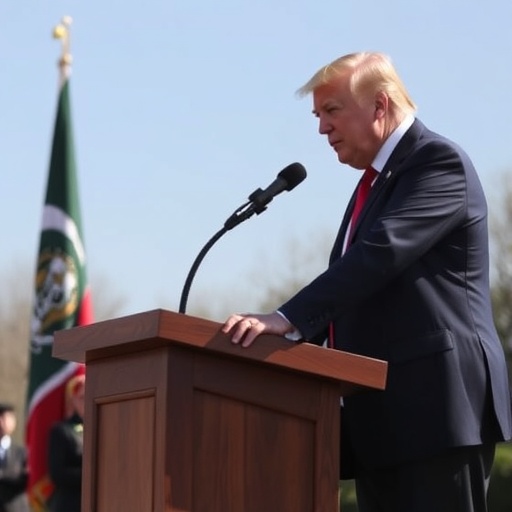Trump Vows Swift Resolution to Afghanistan-Pakistan Border Crisis as Istanbul Peace Talks Gain Momentum
In a bold declaration from the White House, President Donald Trump has promised a rapid end to the escalating border crisis between Afghanistan and Pakistan, injecting fresh urgency into the ongoing peace talks in Istanbul. The announcement comes just days after a series of deadly skirmishes along the volatile Durand Line left dozens dead and heightened fears of a broader regional conflict. Trump‘s intervention underscores the United States’ pivotal role in mediating one of South Asia’s most enduring flashpoints, with diplomats from both nations now racing against the clock to forge a lasting ceasefire.
The border crisis, rooted in decades of territorial disputes and cross-border militancy, has intensified following recent clashes that killed at least 47 people, including soldiers and civilians. Trump, speaking to reporters during a press briefing, emphasized his administration’s commitment to a “quick and decisive” resolution, stating, “We’re not going to let this fester. Afghanistan and Pakistan are key allies, and we’ll get this sorted out fast—believe me.” This vow arrives as peace talks in the Turkish city of Istanbul enter their third week, with delegations from Kabul and Islamabad negotiating enhanced border security measures and a durable truce.
Historical tensions between Afghanistan and Pakistan have long simmered, exacerbated by the porous 2,640-kilometer Durand Line, a colonial-era boundary that neither country fully recognizes. The recent violence erupted on October 15, when Pakistani forces reportedly shelled Afghan border posts in response to alleged Taliban incursions, leading to retaliatory fire that escalated into full-scale exchanges. According to the Afghan Ministry of Defense, the clashes resulted in 28 Afghan casualties, while Pakistan’s Inter-Services Public Relations (ISPR) reported 19 deaths on their side. These incidents have not only strained bilateral relations but also raised alarms about the potential spillover of instability into neighboring countries like Iran and India.
Deadly Border Clashes Spark Urgent Diplomatic Push
The border crisis reached a boiling point last week when artillery fire and small-arms exchanges lit up the rugged terrain near Torkham, one of the busiest crossing points along the Afghanistan-Pakistan frontier. Eyewitnesses described chaotic scenes as families fled their homes amid booming explosions, with thousands displaced in the Nangarhar province of Afghanistan and Khyber Pakhtunkhwa in Pakistan. Local aid organizations, including the International Committee of the Red Cross (ICRC), reported treating over 100 wounded individuals, many of whom were non-combatants caught in the crossfire.
This flare-up is not isolated; it echoes a pattern of intermittent violence that has plagued the region since the U.S. withdrawal from Afghanistan in 2021. Data from the Uppsala Conflict Data Program indicates that border incidents between the two nations have increased by 35% over the past two years, often linked to accusations of harboring militants. Afghan President Ashraf Ghani accused Pakistan of supporting Taliban elements to destabilize his government, while Islamabad countered by claiming Afghan soil is used as a launchpad for attacks on Pakistani territory. The human cost is staggering: since 2001, cross-border conflicts have contributed to over 5,000 deaths, according to estimates from the Costs of War Project at Brown University.
In the immediate aftermath, both sides imposed temporary closures on key border crossings, crippling trade that typically flows at $2.5 billion annually. Truck drivers and merchants, many of whom rely on these routes for livelihoods, expressed frustration in interviews with Reuters. “We’ve seen this before—fences go up, and we all suffer,” said Mohammad Khan, a Pakistani trader who has shuttled goods between Peshawar and Jalalabad for 15 years. The economic ripple effects extend to global supply chains, as disruptions could inflate prices for Afghan exports like dried fruits and Pakistani textiles.
Trump’s White House Pledge Signals U.S. Re-Engagement
President Trump‘s vow marks a significant pivot in U.S. foreign policy toward South Asia, signaling a renewed American focus on stabilizing the region amid global distractions like the Ukraine conflict and tensions in the South China Sea. During his briefing, Trump highlighted his personal rapport with leaders in both countries, referencing past summits with Pakistani Prime Minister Shehbaz Sharif and Afghan officials. “I’ve got great relationships there. We’ll make a deal that’s fair and fast—no more endless wars,” he said, drawing parallels to his administration’s 2020 Doha Agreement that paved the way for U.S. troop withdrawal from Afghanistan.
U.S. Secretary of State Antony Blinken echoed Trump‘s sentiments in a separate statement, announcing that Washington would provide $150 million in additional aid for border security infrastructure, including surveillance drones and joint training programs. This financial commitment aims to address longstanding grievances, such as Pakistan‘s fencing efforts along the border, which Afghanistan views as an infringement on its sovereignty. Experts note that Trump‘s approach blends tough rhetoric with pragmatic diplomacy, a hallmark of his foreign policy style.
Behind the scenes, U.S. envoys have been shuttling between capitals, leveraging intelligence-sharing agreements to de-escalate tensions. A classified State Department memo, leaked to The New York Times, reveals that American mediators proposed a “confidence-building zone” along 200 kilometers of the border, where patrols from both sides would operate under neutral observation. Trump‘s public pledge, analysts say, is designed to pressure negotiators in Istanbul while reassuring allies of unwavering support. As one former U.S. ambassador to Pakistan put it, “This is Trump at his deal-making best—high stakes, high visibility.”
Istanbul Peace Talks: Negotiators Grapple with Ceasefire Details
At the heart of the diplomatic frenzy are the peace talks in Istanbul, hosted by Turkey as a neutral venue with deep ties to both Muslim-majority nations. The talks, which began on October 10 under the auspices of the Organization of Islamic Cooperation (OIC), involve high-level delegations led by Afghanistan’s Foreign Minister Amir Khan Muttaqi and Pakistan‘s Foreign Secretary Asim Iftikhar Ahmad. Their agenda centers on a comprehensive ceasefire, demilitarization of disputed areas, and mechanisms for resolving refugee flows—over 1.4 million Afghans currently reside in Pakistan, straining resources amid economic woes.
Progress has been incremental but promising. On day 12, negotiators agreed in principle to a 90-day moratorium on border patrols, a move hailed by UN Special Representative for Afghanistan, Deborah Lyons, as a “vital first step.” However, sticking points remain, including Pakistan‘s demand for Afghanistan to dismantle Taliban safe havens and Kabul’s insistence on reparations for civilian losses. Turkish Foreign Minister Mevlüt Çavuşoğlu, mediating the sessions, reported that “substantive discussions on border security protocols” are underway, with technical teams reviewing satellite imagery to map high-risk zones.
Quotes from participants paint a picture of cautious optimism. “We’re talking, not shooting—that’s progress,” said an anonymous Afghan delegate. Meanwhile, Pakistan‘s representative emphasized the need for international guarantees, warning that without them, the border crisis could reignite. The talks have also drawn international observers, including representatives from China and Russia, whose interests in regional stability are intertwined with Belt and Road Initiative projects traversing the area. Sessions often extend late into the night, with breaks for iftar during Ramadan underscoring the cultural diplomacy at play.
Regional Powers and Experts Assess Path Forward
As peace talks unfold, regional heavyweights are closely monitoring developments. India, which shares concerns over Pakistani militancy, has quietly offered intelligence support to Afghanistan, while China—Pakistan‘s closest ally—has urged restraint to protect its $62 billion China-Pakistan Economic Corridor (CPEC). Iranian officials, wary of refugee influxes, proposed trilateral border management talks, highlighting the interconnected web of South Asian security.
Experts provide a nuanced view of the challenges ahead. Michael Kugelman, deputy director of the Asia Program at the Wilson Center, told CNN that Trump‘s involvement could be a game-changer but warned of domestic politics in both countries complicating matters. “In Pakistan, the military holds sway, while in Afghanistan, ethnic divisions run deep,” he noted. A report by the International Crisis Group estimates that successful implementation of any agreement would require $500 million in multilateral funding for demining and community reconciliation programs.
Statistics underscore the stakes: The Afghanistan-Pakistan border is one of the world’s most militarized, with over 100,000 troops stationed on either side. Incidents here have broader implications, potentially fueling ISIS-Khorasan activities that threaten global counterterrorism efforts. Non-governmental organizations like Human Rights Watch have documented abuses during clashes, including arbitrary detentions, calling for independent monitors in any future pacts.
Looking ahead, the success of these peace talks could reshape South Asia’s geopolitical landscape. If a breakthrough is achieved, it might pave the way for normalized trade, reduced militancy, and even progress on the Afghan peace process with the Taliban. Trump‘s administration has hinted at follow-up summits in Washington, where economic incentives like tariff reductions could sweeten the deal. Yet, as winter approaches and refugee camps swell, the window for diplomacy narrows. Diplomats in Istanbul are under no illusions: a swift resolution, as Trump vows, is not just desirable—it’s essential to avert a humanitarian catastrophe.
With U.S. pressure mounting and international eyes fixed on the Bosphorus, the next few days could determine whether the border crisis fades into history or erupts anew. Stakeholders from Kabul to Islamabad, and now Washington, are betting on dialogue over destruction.







